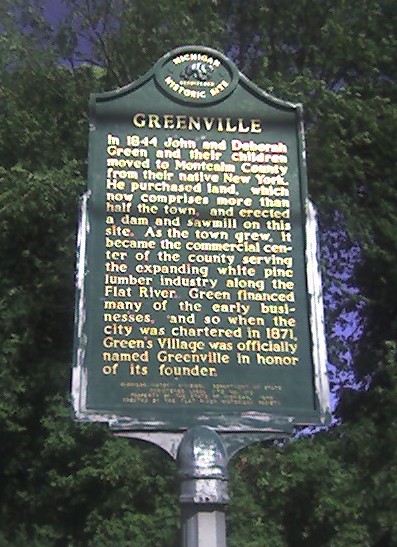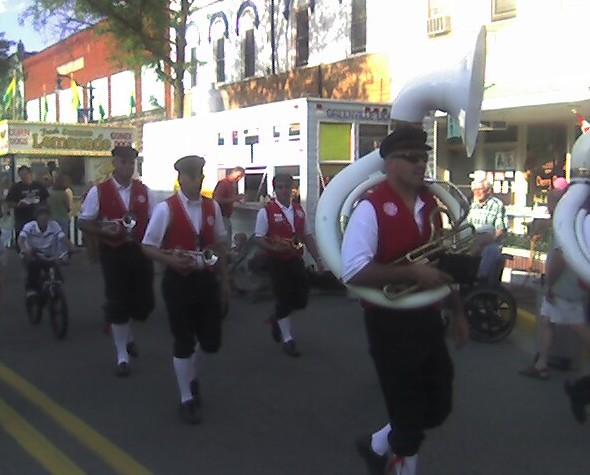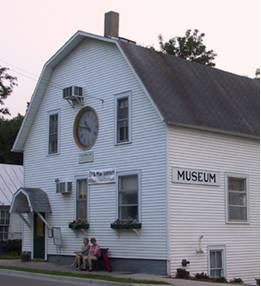An experience of Greenville, Michigan, Summer 2007[1]
 It’s always hard to fight a stereotype. Many Americans think of the Scandinavians, Danish in particular, as rampaging Vikings—like the Hell’s Angels in longships. I think they’ve seen the 1958 movie, The Vikings, the one with Kirk Douglas and Tony Curtis, too many times. Of course Kirk and Tony were notably hygienic among their otherwise mangy cohorts—did you ever notice how the lead actors in these old epic films have perfect white teeth?!
It’s always hard to fight a stereotype. Many Americans think of the Scandinavians, Danish in particular, as rampaging Vikings—like the Hell’s Angels in longships. I think they’ve seen the 1958 movie, The Vikings, the one with Kirk Douglas and Tony Curtis, too many times. Of course Kirk and Tony were notably hygienic among their otherwise mangy cohorts—did you ever notice how the lead actors in these old epic films have perfect white teeth?!
But I did a little research into the ways of the Vikings and discovered there was much more to the culture than constant home-shopping raids along multiple coasts. From the source linked above, I found why the Vikings got such bad press for centuries: they knocked off a church!:
In England the Viking Age began dramatically on June 8, 793 when heathen Norsemen destroyed the Abbey church on Lindisfarne, a centre of learning famous across the continent. Monks were killed in the abbey itself, thrown into the sea to drown or carried away as slaves along with the church treasures.
So from this little incident in 793 they got typecast. I’m sure other than that, the Vikes were model citizens. In any case, by the time Denmark became an official country most of its citizens had become merchants, artisans, farmers, and beer drinkers.  (Not too many health food merchants I read, as two of the mainstays of Danish cuisine are fried meatballs and aebelskivers (pronounced something like abbaskooa = apple pancakes, sign shown here on the left.)
(Not too many health food merchants I read, as two of the mainstays of Danish cuisine are fried meatballs and aebelskivers (pronounced something like abbaskooa = apple pancakes, sign shown here on the left.)
The Danes were also hugely pro-American from the earliest days, about 1 in 10 Danes coming to the States during the 19th century… escaping unemployment or for political freedom—since 1912 Denmark has celebrated America’s Independence Day. From my Web surfing I learn from 1820 to 1920 approximately 340,000 Danes, mostly farmers, made their way to the states.[2]
Greenville is one of the best known American Danish  settlements for a number of reasons, not the least of which is its location on the Flat River and the creative application of the invention of a practical stump puller. Greenville is a farming community that widely employed stump fences to keep livestock on property after the stumps had been cleared from it. Anyway, it’s a humbling thought now for me to realize that my great grandfather on my mother’s side, Jacob Andersen, was one of those hardy Danish immigrants to arrive in Greenville not many years after it had been first settled (by John Green of New York).
settlements for a number of reasons, not the least of which is its location on the Flat River and the creative application of the invention of a practical stump puller. Greenville is a farming community that widely employed stump fences to keep livestock on property after the stumps had been cleared from it. Anyway, it’s a humbling thought now for me to realize that my great grandfather on my mother’s side, Jacob Andersen, was one of those hardy Danish immigrants to arrive in Greenville not many years after it had been first settled (by John Green of New York).

Since technically I’m half Danish, and because I’m on temporary leave back to Michigan from the Free State, it seemed appropriate to meet with Mom, my aunt, and my sister’s contingent to check out the Danish Festival in Greenville. They’ve been holding the celebration since 1964.
We work out the logistics and at different times and places travel to the place where Mama Bear and her dear sister(s)—sadly, the eldest sister June passed on a few years ago—grew up. My lady friend is in tow for the Friday, and after arriving in Greenville, which is approximately 75 miles northwest of Lansing, we go exploring around the old digs. The weather is fine, cooler than normal for mid-August in Michigan.
To give you a background, Mom and my aunt were born two years apart on a farm north of Greenville; Mom was 15 when WWII began, and in fact during the war worked in the Gibson Refrigerator plant which had been converted to making  gliders. We travel up to where their farmhouse once was. The odometer on the minivan confirms they did indeed trudge two full miles to a schoolhouse (which also is no longer there). The photo is a poor one of their still-standing old barn.
gliders. We travel up to where their farmhouse once was. The odometer on the minivan confirms they did indeed trudge two full miles to a schoolhouse (which also is no longer there). The photo is a poor one of their still-standing old barn.
Fast forward to Saturday, we all engage the street-fair part of the festival, which is much like any other. I catch up with my sister at the aebelskivers booth, where she’s third in the only line I’ve ever seen that takes her half an hour to become second in line. But it’s a nice enough day, folks are festive, though  there seem to be an unusual number of teenagers running around looking, let’s just say, poorly mannered.
there seem to be an unusual number of teenagers running around looking, let’s just say, poorly mannered.
Of course, when I was a teenager I read Shakespeare to the underprivileged while working on a cure for cancer… but there is something more amiss these days I feel. Yesterday, we walked thru a small cemetery back in the woods near the old farm; we noted litter and vandalism. Such signs of inconsiderateness seem more commonplace and widespread than before.

I contrast these negative impressions with my own rekindled enthusiasm for knowing the historical realities that shape, in some sense, who I’ve become. I spend as much time as I can in the wonderful community museum called the Flat River Historical Society. My new guru, Eckhart Tolle, author of The Power of Now, tells us not to dwell on the past, but this is different. What better way to experience the Now than by receiving an immediate tactile experience of the Us.
This has been a good experience. I see the sights and take in the human drama of an old Midwestern town famous in some quarters; I wish I had time to cover all the fun we had. I look forward to next year. Perhaps the ennui I mention above, that attends my observations of some local color, is due to the hard times that afflict all of Michigan today.
 In its heyday, Greenville was known as the refrigerator capital of the world with Ranney and Gibson refrigerators both made here by men proud of their country and of their work. The museum features a separate industry building that houses the final refrigerator to roll off the Gibson factory line—it had become Electrolux—in 2006. It was signed by all the workers who then saw their jobs go to Mexico. Did that exodus of jobs make any sense to any bonafide human being, anywhere?
In its heyday, Greenville was known as the refrigerator capital of the world with Ranney and Gibson refrigerators both made here by men proud of their country and of their work. The museum features a separate industry building that houses the final refrigerator to roll off the Gibson factory line—it had become Electrolux—in 2006. It was signed by all the workers who then saw their jobs go to Mexico. Did that exodus of jobs make any sense to any bonafide human being, anywhere?
I have to think one of these days, the idea of quality, like what Robert Pirsig talks about in Zen and the Art of Motorcycle Maintenance, will return… and with it the jobs. This will be the day work acquires the deeply sacred quality it’s supposed to have, and probably once did have in far greater measure. Then good bye corrupt, controlling bean counters with delusions of power… and good bye all that ennui.
Look forward to a Renaissance Festival in Greenville, Michigan.
[1] The 2013 Danish Festival, the 49th, is taking place August 15-19.
[2] This amounted to ~0.7 per cent of the total foreign immigration during this period and only a small fraction of the total immigration from Scandinavia (Sweden, Norway, and Denmark)
This post has been read 1702 times!


